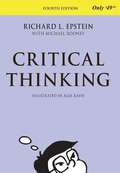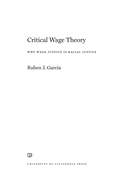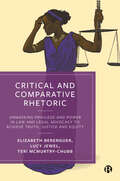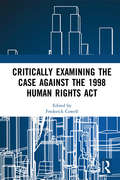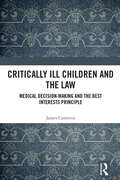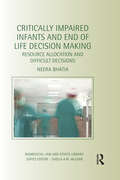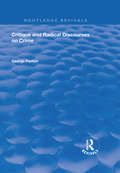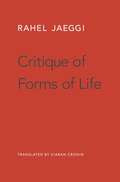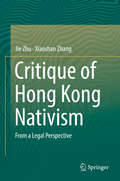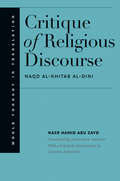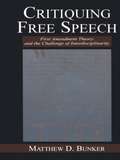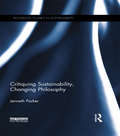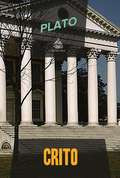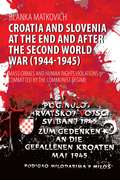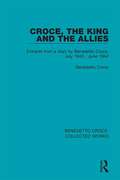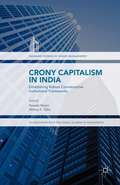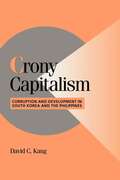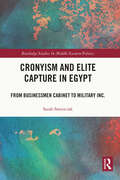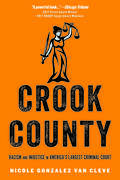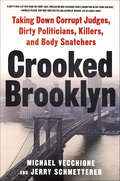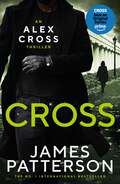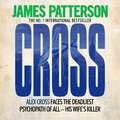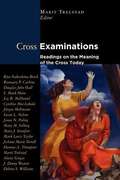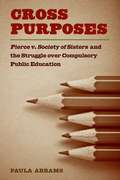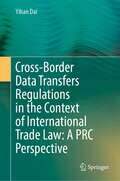- Table View
- List View
Critical Thinking, 4th Edition
by Richard L. Epstein Alex Raffi Michael RooneyWith more than 1,000 everyday examples and exercises, the text engages and challenges the student. It is the only text on critical thinking in which students work with illustrations to convert the nonverbal into arguments and arrive at conceptual understanding.
Critical Wage Theory: Why Wage Justice Is Racial Justice
by Ruben J. GarciaIn this highly original and personal book, Ruben J. Garcia argues forcefully that we must center the minimum wage as a tool for fighting structural racism. Employing the lessons of critical race theory to show how low minimum wages and underenforcement of workplace laws have always been features of our racially stratified society, Garcia explains why we must follow the leadership of social movements by treating increases in minimum wage levels and enforcement as matters of racial justice. Offering solutions that would benefit all workers, especially the immigrants and people of color most often made victims of wage theft, Critical Wage Theory is essential reading for anyone who seeks a more just future for the working class.
Critical and Comparative Rhetoric: Unmasking Privilege and Power in Law and Legal Advocacy to Achieve Truth, Justice, and Equity
by Elizabeth Berenguer Lucy Jewel Teri A. McMurtry-ChubbThrough the lenses of comparative and critical rhetoric, this book theorizes how alternative approaches to communication can transform legal meanings and legal outcomes, infusing them with more inclusive participation, equity and justice. Viewing legal language through a radical lens, the book sets aside longstanding norms that derive from White and Euro-centric approaches in order to re-situate legal methods as products of new rhetorical models that come from diasporic and non-Western cultures. The book urges readers to re-consider how they think about logic and rhetoric and to consider other ways of building knowledge that can heal the law’s current structures that often perpetuate and reinforce systems of privilege and power.
Critically Examining the Case Against the 1998 Human Rights Act
by Frederick CowellSince its inception in 1998 the Human Rights Act (HRA) has come in for a wide variety of criticism on legal, constitutional, political and cultural grounds. More recently, this criticism escalated significantly as politicians have seriously considered proposals for its abolition. This book examines the main arguments against the HRA and the issues which have led to public hostility against the protection of human rights. The first part of the book looks at the legal structures and constitutional aspects of the case against the HRA, including the criticism that the HRA is undemocratic and is used by judges to subvert the will of parliament. The second part of the book looks at specific issues, such as immigration and terrorism, where cases involving the HRA have triggered broader public concerns about the protection of human rights. The final section of this book looks at some of the structural issues that have generated hostility to the HRA, such as media coverage and the perception of the legal profession. This book aims to unpick the complex climate of hostility that the HRA has faced and examine the social, political and legal forces that continue to inform the case against the HRA.
Critically Ill Children and the Law: Medical Decision-Making and the Best Interests Principle
by James CameronA series of recent high-profile court cases has demonstrated the inadequacy of current laws in addressing issues relating to medical treatment decisions involving seriously ill children. The challenges of determining that life-sustaining medical treatment is not in a young child’s best interests have resulted in criticism of the best interests principle. This book explores the theoretical foundations of the best interests principle, and alternatives offered in the academic literature, to allow readers to understand why the principle remains contentious despite its prevalence. It provides theoretical background, exploration of what occurs in practice, and proposes a novel approach to address these challenges. Frameworks for decision-making identified in the academic literature are used to examine the application of the best interests principle in practice in England and Wales, Australia, and New Zealand through a review of the case law and qualitative research with paediatric doctors. The exploration of current practice allows readers to understand the challenges of applying the best interests principle, but also the need to retain a focus on the child. Readers are introduced to a human-rights based approach, which ensures that the focus remains on upholding the child’s best interests but also provides a more comprehensive explanation of the situation. Progressing the debate around end-of-life decision-making and children, the book will be a valuable resource for academics, researchers and policy-makers. It will also provide practical guidance to both legal and medical practitioners in managing disputes about the provision of life-sustaining treatment.
Critically Impaired Infants and End of Life Decision Making: Resource Allocation and Difficult Decisions (Biomedical Law and Ethics Library)
by Neera BhatiaDecisions to withdraw or withhold life-sustaining treatment are contentious, and offer difficult moral dilemmas to both medical practitioners and the judiciary. This issue is exacerbated when the patient is unable to exercise autonomy and is entirely dependent on the will of others. This book focuses on the legal and ethical complexities surrounding end of life decisions for critically impaired and extremely premature infants. Neera Bhatia explores decisions to withdraw or withhold life-sustaining treatment from critically impaired infants and addresses the controversial question, which lives are too expensive to treat? Bringing to bear such key issues as clinical guidance, public awareness, and resource allocation, the book provides a rational approach to end of life decision making, where decisions to withdraw or withhold treatment may trump other competing interests. The book will be of great interest and use to scholars and students of bioethics, medical law, and medical practitioners.
Critique and Radical Discourses on Crime (Routledge Revivals)
by George PavlichThis title was first published in 2000: Critique and Radical Discourses on Crime develops a unique line of thought in contemporary criminology, re-examining an under-researched dimension of radical discourse. In particular, it focuses attention on the distinguishing feature of radical discourses, their allegiance to various visions of critique. The book reassesses the genres of critique evident in previous forms of radical criminology, formulates a different genre of critique appropriate to the uncertainties of postmodern conditions and, shows how these genres can be articulated to differently conceived radical discourses on crime .
Critique of Forms of Life
by Rahel JaeggiFor liberals, the question “Do others live rightly?” seems to demand a follow-up question: “Who am I to judge?” Peaceful coexistence, in this view, is predicated on restraint from morally evaluating our peers. But Rahel Jaeggi argues that criticizing is not only valid but also useful. Moral judgment is no error—the error lies in how we go about it.
Critique of Hong Kong Nativism: From a Legal Perspective
by Xiaoshan Zhang Jie ZhuThis book focuses on the separatist trend in Hong Kong, which it approaches by drawing on historical studies, political analysis, social studies and legal analysis. It offers a comprehensive and interdisciplinary guide to the topic, addressing the historical evolution of “Hong Kong Nativism,” the theoretical connotations and fallacies of “Hong Kong Independence,” and the legal measures taken to forestall it. Written by mainland scholars who approach the subject matter from a legal perspective, the book offers revealing insights for all students and researchers who are interested in Hong Kong Basic Law and the current political situation in Hong Kong.
Critique of Religious Discourse
by Jonathan Wright Nasr Hamid Abu Zayd Carool KerstenAn important work of contemporary Islamic thought argues against the programmatic use of Islamic religious texts to support fundamentalist beliefs First published in Arabic in 1994, progressive Muslim scholar Nasr Hamid Abu Zayd’s controversial essay argued that conventional fundamentalist interpretations of the Quran and other Islamic religious texts are ahistorical and misleading. Conservative religious leaders accused him of apostasy. Marking the first time a work by Abu Zayd is available in its entirety in any Western language, this English edition makes his erudite interpretation of classical Islamic thought accessible to a wider audience at a critical historical moment.
Critiquing Free Speech: First Amendment theory and the Challenge of Interdisciplinarity (Routledge Communication Series)
by Matthew D. BunkerIn this exceptional volume, Matthew D. Bunker explores the work of contemporary free speech critics and argues that, while at times these critics provide important lessons, many of their conclusions must be rejected. Moreover, Bunker suggests that we be wary of interdisciplinary approaches to free speech theory that--by their very assumptions and techniques--are a poor "fit" with existing free speech theory and doctrine. In his investigation of diverse critiques of free speech theory and his sophisticated rebuttal, he provides an innovative and important examination of First Amendment theory. In doing so, he establishes a new agenda for First Amendment theory scholarship that incorporates some of the critics' insights without abandoning the best aspects of the free speech tradition. COPY FOR MAILER: Distinctive features in this volume include: * an overview of the traditional approaches to First Amendment theory, * an examination of work from key First Amendment scholars and theorists, at both the individual and group level, * an emphasis on interdisciplinarity ranging from femi- nist and critical legal scholars to economists and literary theorists, and * a new agenda for First Amendment theory scholar- ship which incorporates critical comment while pre- serving the best aspects of the free speech tradition.
Critiquing Sustainability, Changing Philosophy (Routledge Studies in Sustainability)
by Jenneth ParkerTo increasing numbers of people, sustainability is the key challenge of the twenty-first century. In the many fields where it is a goal, persistent problems obstruct the efforts of those trying to make a difference. The task of this book is to provide an overview of the current state of philosophy in the context of what philosophy is, could be or should be – in relation to sustainability and the human future on Earth. The book is conceived as a contribution to the UN Decade of Education for Sustainable Development, helping to link work on philosophy and sustainability. Critiquing Sustainability, Changing Philosophy focusses on the importance of philosophical work to the formation and effectiveness of global civil society and social movements for sustainability in the context of the Anthropocene age of the Earth. It takes a transdisciplinary systems approach that challenges philosophy and concludes by proposing a greatly enhanced role for philosophy in contributing to global public reason for sustainability. This book will be of interest to philosophers, sustainability practitioners and thinkers, policy makers and all those engaged in the global movement for sustainability.
Crito
by PlatoIt depicts a conversation between Socrates and his wealthy friend Crito regarding justice (δικαιοσύνη), injustice (ἀδικία), and the appropriate response to injustice. Socrates thinks that injustice may not be answered with injustice, and refuses Crito's offer to finance his escape from prison. This dialogue contains an ancient statement of the social contract theory of government.
Croatia and Slovenia at the End and After the Second World War (1944-1945): Mass Crimes and Human Rights Violations Committed by the Communist Regime
by Blanka MatkovichThis book focuses on the events that took place in late 1944 and 1945 in Croatia and Slovenia when the intensity of violence was strongest. At that time, the Communist Party of Yugoslavia (KPJ), assisted by the People’s Liberation Army of Yugoslavia, the Yugoslav Army, the Department for the Protection of the People (OZNA) and the Corps of People’s Defence of Yugoslavia (KNOJ) conducted organized terror not only by intimidation, persecution, torture and imprisonment, but also by the execution of a large number of citizens perceived by the KPJ as disloyal, passive, ideological enemies or class enemies. However, investigating war and post-war crimes committed by communist regime was not possible until 1990, after the democratic changes in Yugoslavia. This book is based on documents kept in the archives of Croatia, Slovenia, the UK, and Serbia. Many of them, especially those in Croatia, recently became available to the public, which makes them extremely valuable source of data to the academics and students in this field and which shed new light on these historical events.°The Communist Party in the former Yugoslavia was an organization which used all available means to seize and keep power, including terror and mass murder, especially between autumn 1944 and summer 1945 when mass killings occurred across the country. However, in the Soviet sphere of influence, investigating war and post-war crimes committed by communist regimes was not possible until 1990. This project not only covers new ground in the research into communist war crimes at the end of and after the Second World War, but also contributes to coming to terms with the past in the successor states of Yugoslavia by studying one of the most controversial episodes in the contemporary history of the Balkans.°Since the October Revolution, when for the first time in history a Marxist party seized state power, communist regimes have influenced the lives of more than a billion people, caused millions of deaths and violated the human rights of countless people. However, in the Soviet sphere of influence and in Yugoslavia, investigating war and post-war crimes committed by communist regimes was not possible until 1990, after the democratic changes in Eastern Europe. Resolution 1481/2006 of the Council of Europe Parliamentary Assembly strongly condemned human rights violations committed by totalitarian communist regimes and the 2008 Prague Declaration on European Conscience and Communism stated that these crimes were comparable with Nazi crimes but, very few people have been tried for committing such crimes. Nevertheless, 25 years later, in former Yugoslav republics this topic is still a matter of political and scientific debates.
Croce, the King and the Allies: Extracts from a diary by Benedetto Croce, July 1943 - June 1944 (Collected Works)
by Benedetto CroceOriginally published in English in 1950 this is one of the most revealing works by one of Italy’s foremost philosophers of the 20th century, who was also a courageous and effective opponent of Fascism. Following the Allied landing at Salerno, Croce was called upon by kings, princes, generals and politicians and asked to decide question of vital importance to Italy. This book records the notes Croce made on political matters in 1943 and 1944 and includes some of the many documents Croce possessed which referred to the attempt in Naples (noted in the Autumn of 1943) to form a Corps of Italian volunteers.
Crony Capitalism in India: Establishing Robust Counteractive Institutional Frameworks (Palgrave Studies in Indian Management)
by Naresh Khatri Abhoy OjhaCrony Capitalism in India provides a comprehensive and scholarly examination of the important topic of crony capitalism, filling an important gap in the market. Bringing together experts from various backgrounds, it addresses the key underpinnings of this complex and multifarious issue. Given the emergent nature of the Indian economy, this book provides important information for decision makers in both government and business to help establish a robust institutional framework that is so desperately needed both in India and globally.
Crony Capitalism: Corruption and Development in South Korea and the Philippines (Cambridge Studies in Comparative Politics)
by David C. Kang Robert H. Bates Ellen Comisso Peter Lange Joel Migdal Helen MilnerWhy has the literature on Asian development not addressed the issue of money politics in Korea? How can we reconcile the view of an efficient developmental state in Korea before 1997 with reports of massive corruption and inefficiency in that same country in 1998 and 1999? Politics is central to the answer. <p><p>In this book the author makes two arguments. First, both Korea and the Philippines experienced significant corruption throughout the post-independence era. Second, political - not economic - considerations dominated policy making in both countries. Focusing on the exchange of favors for bribes between state and business, the author argues that politics drove policy choices, that bureaucrats were not autonomous from political interference in setting policy, and that business and political elites wrestled with each other over who would reap the rents to be had. Even in Korea, corruption was far greater than the conventional wisdom allows.
Cronyism and Elite Capture in Egypt: From Businessmen Cabinet to Military Inc. (Routledge Studies in Middle Eastern Politics)
by Sarah SmierciakExamining business-state networks in Egypt (1991-2020), this book highlights the complicity of international actors in facilitating inequality and elite capture. The interdisciplinary methodology argues that Western actors promoting market liberalization have served as central partners in enabling elites to capture the fruits of Egypt’s economic reforms. In the years leading up to the 2011 Revolution, Egypt’s crony capitalism reached new levels of visibility with the appointment of a "Businessmen Cabinet." The businessmen-turned-state representatives ushered in a wave of "market liberalizing" reforms, expanding avenues for the abuse of power. Providing a detailed look at some of this period’s chief beneficiaries, including a number of Egypt’s wealthiest oligarchs, the volume follows their ascent from former President Hosni Mubarak’s first round of neoliberal reforms in 1991 through his last wave of reforms beginning in 2004 and ending in regime overthrow. The final chapter examines the fate of these elites under the brief rule of Muslim Brotherhood President, Mohammed Morsi, and of Abdel Fattah el Sisi’s current military-backed regime. Based on five years of fieldwork and dozens of interviews with businessmen and state representatives, this book offers a unique look into the politics of policy, and inequality, in Egypt. It will be of interest to scholars reading political economy, international development, and the Middle East studies.
Crook County: Racism and Injustice in America's Largest Criminal Court
by Nicole Gonzalez Van CleveAmericans are slowly waking up to the dire effects of racial profiling, police brutality, and mass incarceration, especially in disadvantaged neighborhoods and communities of color. The criminal courts are the crucial gateway between police action on the street and the processing of primarily black and Latino defendants into jails and prisons. And yet the courts, often portrayed as sacred, impartial institutions, have remained shrouded in secrecy, with the majority of Americans kept in the dark about how they function internally. Crook County bursts open the courthouse doors and enters the hallways, courtrooms, judges' chambers, and attorneys' offices to reveal a world of punishment determined by race, not offense. Nicole Gonzalez Van Cleve spent ten years working in and investigating the largest criminal courthouse in the country, Chicago-Cook County, and based on over 1,000 hours of observation, she takes readers inside our so-called halls of justice to witness the types of everyday racial abuses that fester within the courts, often in plain sight. We watch white courtroom professionals classify and deliberate on the fates of mostly black and Latino defendants while racial abuse and due process violations are encouraged and even seen as justified. Judges fall asleep on the bench. Prosecutors hang out like frat boys in the judges' chambers while the fates of defendants hang in the balance. Public defenders make choices about which defendants they will try to "save" and which they will sacrifice. Sheriff's officers cruelly mock and abuse defendants' family members. Crook County's powerful and at times devastating narratives reveal startling truths about a legal culture steeped in racial abuse. Defendants find themselves thrust into a pernicious legal world where courtroom actors live and breathe racism while simultaneously committing themselves to a colorblind ideal. Van Cleve urges all citizens to take a closer look at the way we do justice in America and to hold our arbiters of justice accountable to the highest standards of equality.
Crooked Brooklyn: Taking Down Corrupt Judges, Dirty Politicians, Killers, and Body Snatchers
by Jerry Schmetterer Michael VecchioneA thrilling memoir from the former chief of the Brooklyn District Attorney's Rackets Division, who took on organized crime, crooked cops, and con men, rarely losing a caseFrom 2001 to 2013, Mike Vecchione was chief of the Rackets Division in the Brooklyn District Attorney's office, which was the largest urban prosecution agency in the country. Vecchione grappled with organized crime and dirty politicians, during which he supervised, investigated, and prosecuted major felony cases.Crooked Brooklyn is a gritty story of corruption, greed and law enforcement. Vecchione navigated a political minefield and expertly rose to the judicial challenges of directing investigations into a wide variety of crimes, from bribe-taking judges to cold-blooded killers. He was responsible for taking down:- Three state Supreme Court judges- One of the most powerful political bosses in the country- Two cops who worked as assassins for the Mafia- A State Assemblywoman- An FBI agent- A corrupt oral surgeon who was secretly selling bones from the recently deceased to medical supply companiesUnbelievable and unforgettable, Crooked Brooklyn is filled with characters and stories ripped straight from the tabloids, great for fans who enjoy Law & Order, readers of true crime and those hungry for details about the system that keeps us safe.
Cross (Alex Cross #12)
by James PattersonAlex Cross was a rising star in Washington, DC, Police Department when an unknown shooter killed his wife, Maria, in front of him. Years later, having left the FBI and returned to practising psychology in Washington, DC, Alex finally feels his life is in order... Until his former partner, John Sampson, calls in a favour. John's tracking a serial rapist in Georgetown and he needs Alex to help find this brutal predator. When the case triggers a connection to Maria's death, could Alex have a chance to catch his wife's murderer? Will this be justice at long last? Or the endgame in his own deadly obsession?
Cross (Alex Cross #12)
by James PattersonAlex Cross was a rising star in Washington, DC, Police Department when an unknown shooter killed his wife, Maria, in front of him. Years later, having left the FBI and returned to practising psychology in Washington, DC, Alex finally feels his life is in order... Until his former partner, John Sampson, calls in a favour. John's tracking a serial rapist in Georgetown and he needs Alex to help find this brutal predator. When the case triggers a connection to Maria's death, could Alex have a chance to catch his wife's murderer? Will this be justice at long last? Or the endgame in his own deadly obsession?(P)2012 Headline Digital
Cross Examinations: Readings on the Meaning of the Cross Today
by Marit A. Trelstad: Do traditional understandings of the cross valorize suffering or violence? Are the older soteriological models, which see redemption as a kind of ransom or debt satisfaction, fitting for the contemporary worldview? Do they produce a piety that acquiesces in needless suffering, or does the cross precisely meet the massive suffering and injustice of today's world?Following an expert introduction to the issues and options by editor Marit Trelstad, each author addresses the Christian symbol of the cross in the context of current theological, sociological, political, or environmental issues.
Cross Purposes: Pierce v. Society of Sisters and the Struggle over Compulsory Public Education
by Paula Abrams"A definitive study of an extremely important, though curiously neglected, Supreme Court decision,Pierce v. Society of Sisters. " ---Robert O'Neil, Professor of Law Emeritus, University of Virginia School of Law "A careful and captivating examination of a dramatic and instructive clash between nationalism and religious pluralism, and of the ancient but ongoing struggle for control over the education of children and the formation of citizens. " ---Richard W. Garnett, Professor of Law and Associate Dean, Notre Dame Law School "A well-written, well-researched blend of law, politics, and history. " ---Joan DelFattore, Professor of English and Legal Studies, University of Delaware In 1922, the people of Oregon passed legislation requiring all children to attend public schools. For the nativists and progressives who had campaigned for the Oregon School Bill, it marked the first victory in a national campaign to homogenize education---and ultimately the populace. Private schools, both secular and religious, vowed to challenge the law. The Catholic Church, the largest provider of private education in the country and the primary target of the Ku Klux Klan campaign, stepped forward to lead the fight all the way to the U. S. Supreme Court. InPierce v. Society of Sisters(1925), the court declared the Oregon School Bill unconstitutional and ruled that parents have the right to determine how their children should be educated. Since then, Pierce has provided a precedent in many cases pitting parents against the state. Paula Abrams is Professor of Constitutional Law at Lewis & Clark Law School.
Cross-Border Data Transfers Regulations in the Context of International Trade Law: A PRC Perspective
by Yihan DaiThis book focuses on the PRC’s cross-border data transfer legislation in recent years, as well as the implications for international trade law. The book addresses the convergence of industries and technologies notably caused by digitization; the issue of conflicts between goods and services; and the General Agreement on Tariffs and Trade (GATT) and General Agreement on Trade in Services (GATS) as well as the difficulty of classifying service sectors under WTO members’ commitments. The book also examines the FTAs that entered into force after 2012 that regulate digital trade beyond the venue of the WTO and analyzes their rules of relevance for cross-border data flows and international trade. It asks whether and how these FTAs have deliberately reacted to the increasing importance of data flows as well as to the trouble of governing them in the context of global governance
